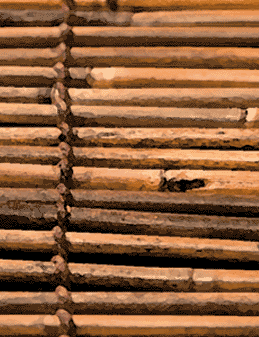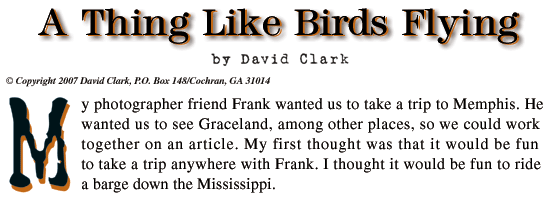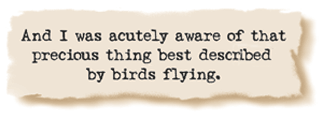

 |
|||
 |
|||
 |
|||

I didn’t want to drive that far to begin with, gas prices notwithstanding. And I could not afford to lay out of paying carpentry and painting work long enough to make the trip. So I told Frank that we’d make a trip, but not to Graceland.
Four days ago, we set out on a journey that was much closer to home. The day before we left, I was working with a man on his house. I told him I wouldn’t be available for work the next two days. “I won’t be around Thursday or Friday. I’m going on a little trip.” I told him we were heading over to Andersonville.
“Hmm, Andersonville.”
“We were talking about going over to Graceland, but I just can’t see it. Too far, gas is too much. Wasn’t much interested in Graceland, anyway.”
“Ah, Graceland, now, well, yeah, me and the wife went over there once. It was, it was, well, it was, I don’t know, it was something, you know what I mean?”
“What do you mean?”
“Well, it was good. You know, it was, well, hey, it was good, it was, well — it was sad, is what it was. But I tell you what, there’s somebody puts fresh flowers on that ol’ boy’s grave every day, I tell you that.”
“What did you like about Graceland?”
“Well, let’s see. We saw that big ol’ pink Cadillac Elvis had, that Jeep he used to film Hah-wah-yah, and everything. Hey, when we were about to leave there, the ol’ gal running the tour asked us if we had any more questions. I raised my hand and said, ‘yeah, can you tell me how I can make my wife stop crying?’ I mean she cried the whole time. It was sad, sad is what it was. That Elvis, he was something else, I tell you.”
Frank and I rode in my old blue Ford truck. I hadn’t taken it out on a long run before, so I checked the oil and transmission fluid and radiator, added a quart of transmission fluid and a gallon of water, and we took off from my little farmhouse in Cochran, Ga. We were about 30 miles west of my house when I remembered that I forgot to throw in the spare tire and jack. I didn’t bring it up, figuring that would give Murphy’s Law too much power in the game.
The morning was already hot. We had the windows down, the floor vents open, and the door vents wide open. The late May air was dry and dusty as we headed west on Highway 26, across I-75 and into the territory where the Mennonites tend their beautiful fields. We saw a young Mennonite gal cutting grass on a riding lawn mower. She was wearing her little hat and a long dress. She was barefooted, just riding along. The mower was red, which struck me as funny because I’ve heard most of those folks insist that their cars are black. I wondered what she thought of Elvis. Countless flocks of white cowbirds were flying over the fields and roads along our way.
The cotton was just sprouting in the fields. We saw nice stands of thirsty corn. The wheat was waving golden and ready to harvest. One man’s irrigation pivot sprayed water on his corn. We crossed the Flint River; it was low. After an hour of driving, we pulled through the gates at Andersonville. Frank said: “See if you can find a shady spot to park.”
There weren’t any shady spots. That’s the problem with almost anything suffering what is known as “being improved.” They tear out all the shade trees to make room for the bulldozers and dump trucks, pave what’s left, and then plant more shade trees that won’t make decent shade for another fifteen or twenty years. It seems silly, but that’s just how government does things, I guess.
The visitor’s center at Andersonville is built to look like a prison stockade. This is so because it’s the home of the National Prisoner of War Museum. Andersonville was the site of the notorious Civil War P.O.W. camp known as Camp Sumpter. I’d been meaning to go over to Andersonville for years. After finally going the first time about two weeks ago while visiting a friend in nearby Americus, I knew Frank and I had to go there. I took the self-guided tour through the museum.
The thing begins with video footage of gray-haired men with big wet eyes, talking about what it was like to be captured at gunpoint in Vietnam or World War II. What follows on the tour is a little journey into the experience — photos and video footage of men making the Bataan Death March, photos of Vietnam-era prisoners kneeling on the floor, sketches showing Revolution-ary war prisons. The images were barbed-wire and shackles, bars and chains, whips and torture. There were drawings made by prisoners in various camps from various wars, and items made from found materials by ingenious prisoners who just wanted a pair of delicate gloves, or a little toy, or a piece of art—anything to create some semblance of normal life.
You turn a corner in the exhibit and come to a replica of a bamboo cage used by the North Vietnamese. It was about the size of a healthy doghouse. Seeing the bamboo cage reminded me of a man I knew quite well who had been a P.O.W. during Vietnam. His name was Bud. I rented a shop from him back when I was a mechanic in my 20’s.
Bud had been one of the top students in his class at Georgia Tech. He was part of a nationwide group of top engineering students approached by the Army to take on a project of determining why the M-16 gun jammed in combat. Each night the group of young men received 15,000 M-16’s. They would disassemble the guns, measure all the parts, and reassemble them in time to hand them back in the next day, at which point they would get another batch of 15,000. They kept rotating these two batches of 15,000 guns until they figured out the problem. When Bud signed up for the project, he was told he would remain a civilian, and his group would never be at the front lines.
“Yep, they were right—we weren’t at the front lines, exactly. We were right behind them instead. We followed the army as it moved along the ground, and did our work in tents. It was a pretty good job—until the day I was captured by the North Vietnamese.”
Bud was kept in a bamboo cage for 18 months. The cage was just big enough for Bud to squat or stand. He couldn’t actually sit down or lie down. He wasn’t let out to exercise. The cage was fully exposed to the weather at all times. Bud came down with dysentery, malaria, and a few other unpleasant things which I’ve forgotten in the 20 years since we talked about it in my shop.
By this part of the story, Bud was staring into space, taking an occasional slug off a bottle of whiskey.
“So how did you get loose?”
Bud looked down at the floor. “Oh, I tricked one of the guards, cut my way out of the bamboo cage, and ran.”
Bud didn’t say so, but I had the fairly certain feeling he had slit the guard’s throat.
“What did you do?”
“I ran. I ran for days and days.”
“How did you know where to go?”
“I didn’t. I just ran. It was all jungle, and I just ran. I was sick as hell, and weak as hell. But I was scared, so I ran.” He pointed a trembling index finger in my face: “You’d be damn surprised what a person is capable of doing in those circumstances. The will to survive is a mighty powerful thing.”
Bud climbed a tree to try to get his bearings. This was a crucial step, because he figured out he was closer to freedom than he thought. Then he fell out of the tree and broke his leg.
“I don’t know how I did it, but I kept running as best I could. I ran for about six weeks altogether. I ate bugs, worms, anything I could find. I only slept a little bit that whole time. Every time I’d lay down to sleep, I’d hear something, get scared, and start running again.”
Bud took a slug of his whiskey and stared into space.
“But how’d you finally make it out?”
“Oh, I came up to a road and saw a jeep. I had no idea if they were on our side or not, but I walked out in front of the jeep and passed out. Next thing I knew I woke up in a hospital. It turned out the men in the jeep were South Vietnamese officers, and they took me in.”

It was strange how we began talking about all this. In the three years I had rented from Bud, he would come by my shop every so often. He’d sit down with his bottle, and we’d talk about steel and gears and mechanisms. We’d talk about what I was working on and what I was learning, or what he was working on in his industrial machine shop and what he was learning. He’d tell me about growing up in his father’s steel foundry in Birmingham. He’d show me a scorpion he had cast in gold using the lost wax process. One day he brought a bronze casting of his right hand.
Once he had me sit in his car with him to listen to a tape of a guy playing bamboo Panpipes. We sat there, and Bud turned the tape up loud. He nursed his whiskey through a few songs, and then a song came where the music swelled and began to soar. He slammed the palm of his hand down on the steering wheel, and yelled: “Listen to that!” Then he burst into tears, and buried his face in his hands. After the song was over, he reached down and turned it off. Then he apologized. “I don’t mean to be acting like a damn fool. That music just gets to me, that’s all. It reminds me of birds flying.”
I told Bud it was all right to cry. The first time I told him it was ok to cry, he just stared at me for the longest time with his big wet eyes. Then he nodded, took a pull at his whiskey, and said: “Well, it just reminds me of birds flying, that’s all. I reckon I better go.”
After the first crying incident, Bud began coming around the shop more often. He’d sit down on a stool I had at my workbench, and talk about metal or gears or how things worked. He would talk about the properties of different metals like he was describing the delicious beauty of some woman. His talking always revolved around some problem he was trying to solve, and I guess he was working out his current challenges by expounding on the materials at hand.
Then one day, he came in while I was pulling an engine. I had the cherry picker set up in front of an MGB. The cherry picker’s chain was attached to the engine, and I was all set to yank the engine and transmission out. Bud leaned against the cherry picker and operated the hydraulic cylinder’s lift arm while I guided the motor and gearbox out of the car. The motor cleared the grill, and he moved the cherry picker backwards while I lifted the tail of the transmission over the front of the car. Bud leaned on the cherry picker. “Well, that part’s done.” I was wiping my hands on a rag, and kicking a pan underneath the transmission to catch the dripping gear oil.
Bud eased the cylinder down so the motor and gearbox would rest on the floor. I had just picked up my air wrench to remove the bolts holding the transmission to the engine, and Bud said: “Hey, let me tell you one I heard today.” And he began telling me a Jerry Clower joke. Bud loved Jerry Clower, who was hitting his heyday at the time.
Bud said the joke’s punchline and started laughing from deep in his guts. He was leaning on the back end of the cherry picker, and I was squatting down, waiting for him to finish the story so I could remove those bolts and get on with my work.
Bud laughed for about five good seconds, and then suddenly he stopped and said: “Oh.” His eyes closed, his lower lip began to quiver, and his grip began to loosen on his whiskey bottle. He made a desperate grab for the cherry picker. He held on for about two seconds—long enough for me to drop my air wrench and grab the whiskey bottle before he dropped it.
Then he collapsed.
Now, Bud was a big man. He was probably six foot four. I was a strong young man back then, but catching a man’s dead weight was a surprisingly difficult task. I eased him down to the concrete floor.
This all happened in less time than it just took to type it out. Bud’s body was sprawled over the cherry picker’s cross-beams. His head was next to the leg of my workbench. I didn’t know what to do, exactly. I checked his pulse. It was strong and steady. I yelled at him: “Bud! Bud! Are you all right?” He didn’t respond. I leaned over his body to pick up the phone. Just as I released the long rotary-dial zero for the operator, Bud began to snore.
I put the phone down and turned back to look at Bud. He was snoring loudly and had his hands folded on his chest, looking for all the world like he was just taking a nap. I shook him. His snoring didn’t change. I slapped him. He just sort of grunted, but didn’t respond any more than that. I was yelling at him: “Bud! Bud!” He didn’t respond other than to snore deeply.
Four or five minutes passed by. I sat there, dumbfounded. Suddenly, Bud stretched out his arms, began yawning, and woke up. His eyes searched his surroundings before he lifted his head. He focused on the cherry picker standing over him. He looked at the bottom of my workbench. He squinted in the bright lights hanging overhead. Then he said: “Hmm. Must have went out.”
I said: “What in the world are you doing?”
“Huh?” Then he looked up at me. “Oh, I wasn’t sure where I was. Help me up, will you?” I helped him sit up. He looked over, saw his whiskey bottle, picked it up, and took a slug.
“Sorry about that.”
“Well, it’s alright, but what’s going on?”
Bud was rubbing his eyes, like a kid who had just woke up from a nap.
“Aw, it’s a long story.”
“Well, how about you tell it. You come down here a lot, and if you’re going to be passing out in my shop you need to let me know what to expect. Are you drunk?”
“No, man, I ain’t drunk. It’s a long story.”
Then he began telling me about the Army project and the bamboo cage. It turns out that the malaria and dysentery had given him a high fever for a long time, and from that fever he’d gotten narcolepsy.
“What in the world is narcolepsy?”
“Oh, you just saw it. I just go to sleep sometimes. Have to take Dexedrine every day so I can work, and by the end of the day it wears off.”
“That sounds like a pain in the butt.”
“Yep, it is. You should have seen how I found out about it. I was driving down to Tifton to check on a job, listening to a Jerry Clower tape that had just come out. I started laughing at one of Jerry’s stories, and next thing I knew I woke up. But in the meantime, I had run over somebody’s mailbox, up through their yard, and crashed through the wall of their house into their living room where they were watching TV. The man was sitting on his sofa yelling at me, asking me what the world I thought I was doing. The woman was really ticked because I’d torn up her flower bed. The cops took me to a hospital, and that’s when they figured out I had this narcolepsy stuff.”
From then on, if Bud started telling a funny story, I stopped what I was doing and walked over close to him. One thing you could count on—if he began telling a funny story at the end of the day, he’d laugh for about five seconds, his lower lip would begin quivering, he’d yawn, and then he’d fall. He’d immediately start snoring. About five minutes later, he’d wake up refreshed. I never saw Bud again after I quit being a mechanic. I saw his obituary in the paper a few years ago, and it made me sad to know I’d never taken the time to visit him.
Seeing the bamboo cage at Andersonville made me think about Bud, and put all my memories of him in a completely different perspective. Hearing about spending eighteen months in a bamboo cage is one thing. Seeing what the cage looked like was a whole different ballgame. Seeing that little bamboo cage made me understand why Bud loved the Panpipe’s soaring music that reminded him of birds flying.
Standing and touching the bamboo cage’s stark reality helped me know to some small degree why music sounding like birds flying was so important to a man who had squatted and stood for eighteen months in a doghouse-sized cage, and why this loner artist of a metalworking genius who had made a forty-two day freedom-run through the jungle would often say, out of the blue: “Listen, most people just have no earthly idea how precious freedom is. They just have no idea. Whatever you do, don’t forget that, don’t forget, you hear?” Bud would take a slug of his whiskey, slam the palm of his hand on the workbench, and yell like he was a preacher: “It’s precious, I tell you—freedom is so precious!”
Then he would burst out crying like he did when the birds-flying Panpipe music would swell, put his whiskey bottle down, and bury his face in his hands. Then he’d look up at me through his big wet eyes, and say: “Just don’t forget, you hear? Don’t ever forget—freedom is damn precious.” Then he’d burst out crying all over again, and bury his face in his hands again.
You turn another corner in Andersonville’s P.O.W. Museum, and there’s a big concrete cross. It seems huge in the context of the little exhibit hallway. I wondered why it was there, and then I read the sign: The cross was made by men imprisoned by the Japanese during World War II. The head of the prison gave the prisoners concrete to make a memorial to their friends who had died. It was his intention that they would make a Buddhist type of memorial, apparently because of the indoctrination they were receiving. But the men made a big cross instead. Somehow or another, arrangements were made to bring that cross from wherever it was in the South Pacific all the way over to Andersonville.
Seeing that cross was the beginning of my tears in this museum. My impression of the exhibit from that point forward was that all the examples illustrated the change from a desperate grabbing at a semblance of hope towards the deep, smoldering fire of determination to somehow regain freedom. The next corner had a section of full-sized tunnels, with drawings showing different tunnels dug by prisoners through the years.
Then you come around the last corner, where a silent video shows Bataan Death March survivors being liberated — gaunt skeletons of raggedly-dressed men with bony arms, sunken cheeks, ribs sticking out everywhere, wearing the biggest grins you ever saw, and big wet eyes filled with a joy that cannot be described.
The footage shows a gang of forlorn men sitting on the ground, and at the startling sight of a big American flag unfurling down the wall of a Nazi prison camp tower, the men spontaneously rise to their feet as one unit, all raising their fists in the air, and all jumping up and down. The silent footage shows dirty, hollow men laughing and hugging each other, trying to somehow express the inexpressible. The black and white footage zooms in close to the faces of unshaven men wearing dirty caps, grinning and giving a thumbs-up to the cameraman.
Then a skinny somber man is walking out of an airplane, stopping to salute other healthy grinning men on the ramp, then walking stiffly down the airplane steps, and suddenly seeing a blur of dress and hair and outstretched arms bursting out of the lower corner of the footage’s frame, he begins running towards the blur in a dress with her arms flung open wide, that blur being followed by three more blurs of young children, and all of them clearly engulfing this skinny man with as much hugging as they can manage. Then there’s a young black man with a look of pure wonder on his face being smothered by his Mama who’s kissing him back home while his gray-haired Daddy with big wet eyes stands behind her grinning so wide his face is about to bust. Then another skinny man leaves the plane, walking smartly up to a microphone but never managing to say anything, because he’s swallowed up first by a woman’s hugs.
This piece of footage zooms in to show just the head and shoulders of the man and woman, and the man’s face contorts as he tries to maintain his manliness while rubbing his cheek repeatedly against the side of his wife’s head as he runs his hands through her hair, and as his lips silently form the words “I love you,” his contorting face explodes in the excruciating release of a man bawling his way back into a preciousness that my friend Bud said most of us cannot understand.
The self-guided tour ended here. I leaned hard against the wall, crying from deep in my guts, vicariously experiencing the unspeakable gratitude felt by these men and their mamas and daddies and wives and children at having recovered a thing they’d never fully considered holding until it was suddenly stripped from their unknowing grasp.
I was finally knowing how to grieve for my friend Bud and the tangled soul he unravelled in my shop.
And I was acutely aware of that precious thing best described by birds flying, a thing I admittedly cannot begin to understand, a thing that in these days of warrantless wiretaps and increasingly unrestrained Homeland Security seems not only damn precious but astonishingly fragile.
This story is from David Clark’s new book, “Simply America.” You can order the book at Clark’s website, www.outofthesky.com, or contact him at dclark@outofthesky.com.

©Copyright 2007 Bridgital/SouthernReader. All rights reserved.